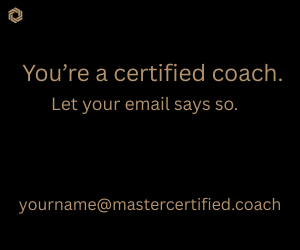Often when our clients say, “I don’t know,” they really do know, but it’s uncomfortable to face the answer. When we trust our instincts as a coach and help them speak that uncomfortable truth—whatever it may be—we may just be rewarded with an “Aha!” moment.
A client’s “I don’t know” can represent many things. Examples include that your client knows what they really need to do, but they’re not ready to do it. It could be that they don’t trust us enough yet and are afraid what we will think. They may be afraid to speak their truth because their inner critic thinks the answer is ridiculous or immature (“Don’t be such a baby!”). Or, perhaps they think that if they say the answer out loud, they’ll have to commit to doing something scary.
When people don’t acknowledge what they’re REALLY thinking, they’re essentially rejecting a part of themselves. It means they’re more focused on who they think they SHOULD be rather than who they actually are. It’s likely that their “I don’t know,” their unwillingness to face the truth of what they think and feel is what’s blocking them from moving forwards.
The answer isn’t to help them act, but to help our clients face their thoughts and feelings honestly. Whether it’s “I know I need to quit my job, and I’m afraid” or “It’s petty, but I just don’t want to apologize” or “I think I’m a coward; I’m terrified they’ll laugh at me” or “I know I need to stand up to them, but I hate conflict and I’m afraid they’ll end our friendship.”
Now we have the truth—and something real to work with.
This can be deep work. It’s important to remember that if it was easy for our client to say aloud and acknowledge their truth, they would already have done so.
When the client takes the bold and brave step to speak their uncomfortable truth, it’s like taking the plunge—scary but exhilarating. Often a relief, too. Then, from their uncomfortable truth, you can look more deeply at their feelings, desires, fears, judgements, assumptions and limiting beliefs. You can help them move forwards.
From here, you can help them break something hard down into smaller steps, discover new/better options or role play. You should also prepare backup plans should the worst happen. MOST importantly, you’re helping your clients honor their whole person—the so-called “good” bits as well as the “bad.”
Facing our truth, however painful, is what sets us free. This is often what gives us Aha! Moments.
Here are 12 Ways to Turn “I Don’t Know” into an Aha Moment!
- Simply use silence. Don’t respond at all and wait calmly for their next answer.
- “What is it like for you to not know?”
- “How do you benefit from not knowing?”
- “How do you feel right now, as you think about answering this question?”
- Use only with sensitivity and in good rapport: “Hmmmm. I wonder what are you pretending not to know?”
- “If you allowed yourself to speak aloud whatever you might be avoiding thinking and feeling, however childish, silly or petty it might seem, what would it be?”
- Gently: “What’s underneath the ‘I don’t know’?”
- Slowly: “Take a deep breath, and just allow yourself to feel into the question for a moment. Relax into this ‘don’t know’ place.”
- “So, if (what they don’t know about) had a color/smell/taste/sound, what would it be?”
- “I feel that too sometimes. Take your time, and let me know when you’ve thought of something.”
- “If you secretly knew the answer, and no one (not me, you or anyone else) could judge you or make assumptions, what would it be?”
- “Imagine you’re in a helicopter flying over the map of your life. What do you notice about your life from way up there? Looking down with this new perspective, how would you answer the question now?”
Important: When we encourage our clients to reveal themselves, they must trust and feel safe enough to be vulnerable with us. What seems small or unimportant to us could be significant for them. Take your time. Be kind, compassionate and understanding. Remember to reflect on what they’ve said and confirm understanding, without judgement. Be a coach. Be YOU.
Now you need never feel caught by, “I don’t know” again. Have patience. Use one of these responses, and you never know, it may even be YOU who has the Aha moment!
Disclaimer
The views and opinions expressed in guest posts featured on this blog are those of the author and do not necessarily reflect the opinions and views of the International Coach Federation (ICF). The publication of a guest post on the ICF Blog does not equate to an ICF endorsement or guarantee of the products or services provided by the author.
Additionally, for the purpose of full disclosure and as a disclaimer of liability, this content was possibly generated using the assistance of an AI program. Its contents, either in whole or in part, have been reviewed and revised by a human. Nevertheless, the reader/user is responsible for verifying the information presented and should not rely upon this article or post as providing any specific professional advice or counsel. Its contents are provided “as is,” and ICF makes no representations or warranties as to its accuracy or completeness and to the fullest extent permitted by applicable law specifically disclaims any and all liability for any damages or injuries resulting from use of or reliance thereupon.
Authors
Post Type
Blog
Audience Type
Coach Educators, Experienced Coaches, External Coaches, ICF Chapter Leaders, Internal Coaches, New Coaches, Professional Coaches, Team and Group Coaches
Topic
Coaching Toolbox, Discover - Your Coaching Career
Related Posts
The Coaching Trap: When Empathy Becomes Exhaustion
Prepare yourself for the fact that this will not be about you…
Your Guide to Preparing for the ACC Exam
Much like a smartphone upgrade that introduces improvements for a smoother user…
How Coaching Is Driving Inclusion Around the Globe: Lessons from Local ICF Chapters
When a group of mothers in Kazakhstan, many of whom had never…








